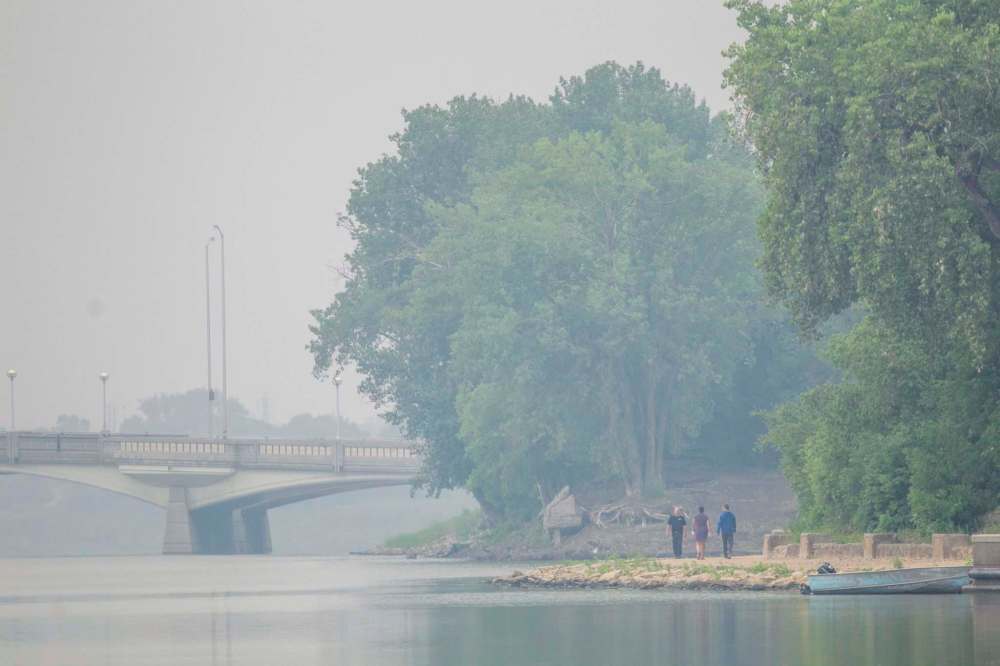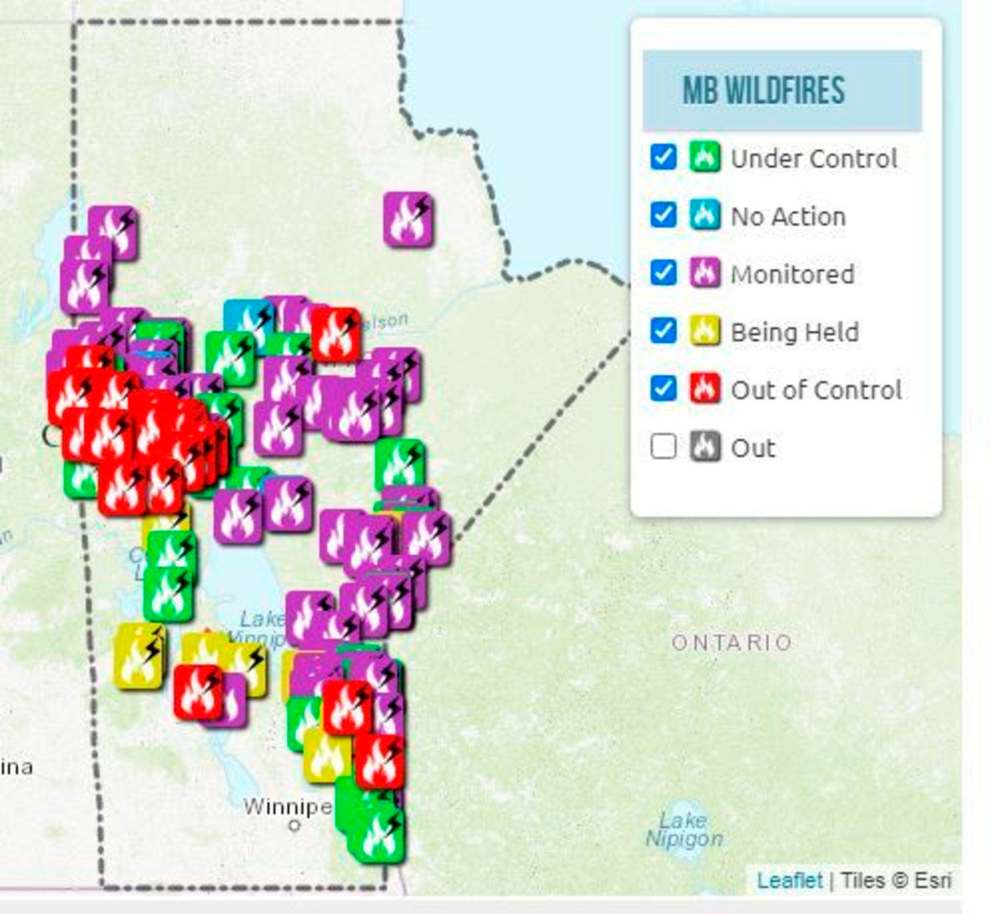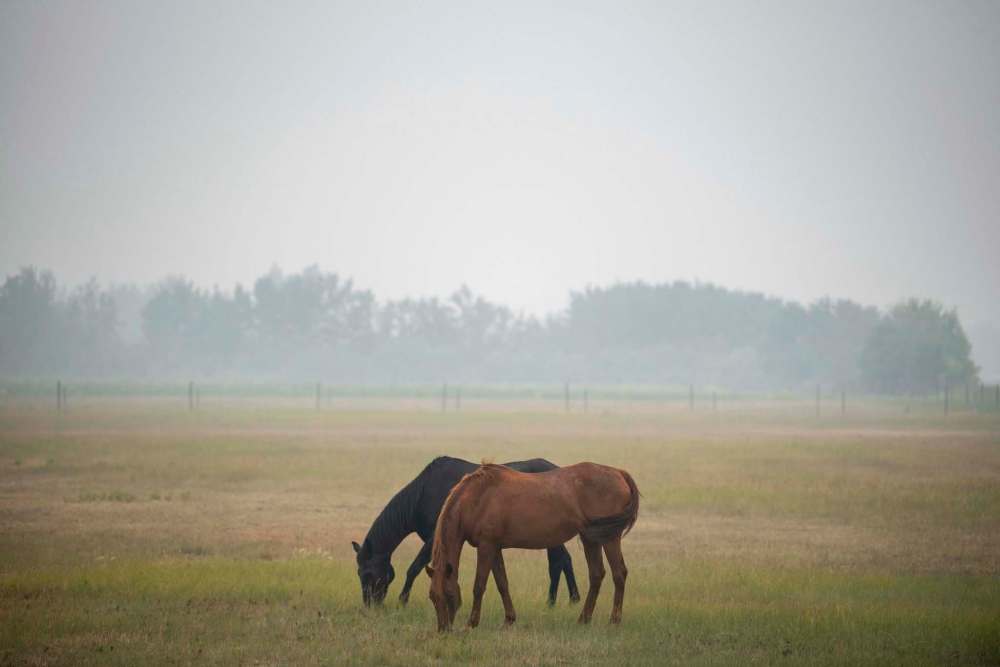Fires, smoke force evacuations from four First Nations
Advertisement
Read this article for free:
or
Already have an account? Log in here »
To continue reading, please subscribe:
Monthly Digital Subscription
$0 for the first 4 weeks*
- Enjoy unlimited reading on winnipegfreepress.com
- Read the E-Edition, our digital replica newspaper
- Access News Break, our award-winning app
- Play interactive puzzles
*No charge for 4 weeks then price increases to the regular rate of $19.00 plus GST every four weeks. Offer available to new and qualified returning subscribers only. Cancel any time.
Monthly Digital Subscription
$4.75/week*
- Enjoy unlimited reading on winnipegfreepress.com
- Read the E-Edition, our digital replica newspaper
- Access News Break, our award-winning app
- Play interactive puzzles
*Billed as $19 plus GST every four weeks. Cancel any time.
To continue reading, please subscribe:
Add Free Press access to your Brandon Sun subscription for only an additional
$1 for the first 4 weeks*
*Your next subscription payment will increase by $1.00 and you will be charged $16.99 plus GST for four weeks. After four weeks, your payment will increase to $23.99 plus GST every four weeks.
Read unlimited articles for free today:
or
Already have an account? Log in here »
Hey there, time traveller!
This article was published 20/07/2021 (1607 days ago), so information in it may no longer be current.
The majority of residents of four First Nations communities on the east side of Lake Winnipeg have been evacuated due to wildfire smoke.
Ernest Keyper of Little Grand Rapids, who arrived in Winnipeg on the last de Havilland Dash 7 to leave one of the communities Monday, said local nursing station staff were planning for a potential evacuation during the last two weeks, but it still was a surprise when the decision was made.
There was no panic — everything was orderly and people knew who was going on what plane at what time in advance, he said Tuesday.

“We never expected it, but we were planning ahead with leaders because we knew it would get worse (with the) infrequent rainfall this year,” Keyper said.
“The situations were different each new day, depending on the winds, and there was little to no relief from the rain. It has been dry and, yes, the smoke and ash is what frightened the community.”
Keyper said the move comes just three years after community members were forced to leave for similar reasons.
“2018 was a big learning experience because much of my generation had never experienced that,” he said.
“With climate changes, we’ve had to deal with this twice in just a short span of time… We are hoping that the rain brings relief to the province.”
Canadian Red Cross spokesman Jason Small said transport of vulnerable people began in Little Grand Rapids and Pauingassi on July 12, moving up to all residents in recent days.
“We have now completed the full evacuations of both First Nations, as of yesterday,” Small said, adding transports out of Bloodvein and Berens River began Monday and are continuing.
“People from Berens River are being flown out, while people in Bloodvein are driving,” he said, adding all residents had been brought to and housed in Winnipeg, prior to some from Berens River being flown to Brandon.
Small said more than 1,300 people have been registered in area hotels, but the number is continuing to grow. The Red Cross is providing toiletries and setting up meals.
“We don’t know how long this will last,” he said. “The community decides when people have to evacuate and the community decides when to call people back, when it is safe.”
Little Grand Rapids Chief Raymond Keeper is one of about 90 people staying behind to maintain the community 280 kilometres northeast of Winnipeg.

“It wasn’t too bad today, it was good all morning, but then the wind shifted and a little more smoke came in,” Keeper said by phone.
“We’re going to wait and see what’s happening before we bring people home. We don’t want to put people in danger again.”
Keeper said the evacuation was orderly, but it did have one hiccup because of the smoke.
“They couldn’t land right away here,” he said. “They had to circle around until it was all clear.
“We have a priority list of people… and everybody was prepared. There was no last-minute ask to evacuate… The staff did a wonderful job and I thank them.”
Alan Owens, 62, said he was more worried about the smoke and air quality than he was about the fire encroaching on his community of Pauingassi First Nation. He and his family have been in Winnipeg for a week already.
“Not really (worried), I’m just asking people, is anything burning, like our stuff?”
Owens said he was working as a security guard at the nursing station when he heard his name called on the local radio station, telling him it was his turn to leave with the next group. “I have to go when they call out my name. I don’t mind.”
Don Hallett, assistant director of Manitoba Wildfire Service, said there were 129 wildfires burning in Manitoba on Tuesday, with more smoke blowing in from neighbouring provinces.
“We’ll take any precipitation we can get, as long as there is no lightning,” said Hallett. “Lightning is our No. 1 cause of concern right now.”
The wildfires and the “high” to “extreme” fire danger have led to the implementation of fire and travel restrictions in large parts of the province.

Hallett said with the blazes in British Columbia, Saskatchewan and Ontario, there won’t be any firefighting assistance coming from those provinces for the time being.
“Right now, there’s a 20-person pack from Nova Scotia to help give our guys a bit of a reprieve,” he said.
Late Tuesday, Public Safety and Emergency Preparedness Minister Bill Blair said in a tweet a Manitoba government request for military assistance had been approved. Up to 120 Canadian Forces members will be dispatched to help fight wildfires across the province.
David Phillips, a senior climatologist with Environment Canada, said Manitoba and a huge swath of the rest of the country are covered in a blanket of smoke.
“There are seven provinces and one territory — and 170 regions have air advisories,” he said.
“Winnipeg has had 35 hours of smoke in the last two days and, as soon as the rain ended (Tuesday morning) the smoke came back. You would need a major rain event for four days, or a major wind system, to move the smoke out.”
Phillips said Environment Canada’s air quality health index is a scale from one to 10: Winnipeg was considered to be 10-plus both Monday and Tuesday.
kevin.rollason@freepress.mb.ca

Kevin Rollason is one of the more versatile reporters at the Winnipeg Free Press. Whether it is covering city hall, the law courts, or general reporting, Rollason can be counted on to not only answer the 5 Ws — Who, What, When, Where and Why — but to do it in an interesting and accessible way for readers.
Our newsroom depends on a growing audience of readers to power our journalism. If you are not a paid reader, please consider becoming a subscriber.
Our newsroom depends on its audience of readers to power our journalism. Thank you for your support.
History
Updated on Wednesday, July 21, 2021 6:40 AM CDT: Adds final copy






